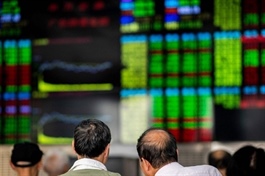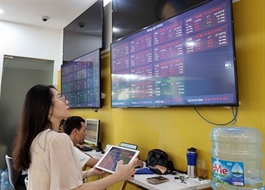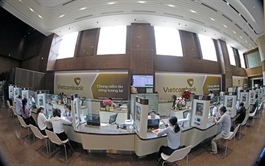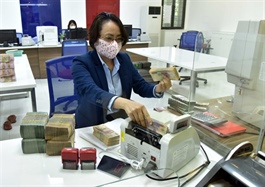Stock market rebounds as US eases tariff stance for now
Stock market rebounds as US eases tariff stance for now
Vietnamese stocks responded accordingly following tariff U-turns by the United States, and buoyed further by Vietnam’s own solid foundation for sustained growth.
The domestic stock market opened on the morning of April 11 with a 60-point gain. However, the momentum later narrowed as more investors sold off shares, resulting in more active liquidity. Several stocks in industrial real estate hit the floor price due to heavy selling pressure.
The day previously, there was a frenzy of gains, with a sweeping wave of limit-up rallies across the board. All stocks in the VN30 basket surged to their ceiling prices in the absence of any sell orders, marking the first time such a phenomenon has occurred. The VN-Index soared by over 72 points, or 6.62 per cent, at the opening, marking its sharpest increase in history.
Despite the strong recovery on April 10, the index remained about 11.5 per cent below its level prior to the initial US tariff announcement on April 3. The dramatic rebound followed a turbulent week in which the VN-Index lost nearly 224 points, or 17 per cent, across four consecutive sessions, plunging to its lowest level since November 2023.
According to financial experts, the Vietnamese stock market has overreacted to external news, particularly tariff-related developments. This view was supported by VinaCapital in its report analysing the impact of new US trade policies.
“The recent selloff has created a buying opportunity for active fund managers to accumulate fundamentally strong stocks that are less directly affected by tariffs, now trading at more attractive valuations,” the report stated. “The companies most likely to benefit are those supported by government initiatives to offset tariff-driven GDP impacts.”
Nguyen The Minh, head of Research and Development for Retail Clients at Yuanta Securities Vietnam, said foreign-led businesses are unlikely to immediately shift their production chains to other countries.
“Meanwhile, American consumers will continue to spend on essentials,” he added. “After such steep discounts, the market is likely to reprice quickly. Investors should reduce leverage by settling margin loans and injecting more funds to lower margin ratios. Those with safe levels of leverage should hold their positions rather than sell in panic.”
In its monthly strategy report released on April 8, SSI Research emphasised that short-term downside risks from the White House’s new tariff policies are inevitable.
“However, these bad news events may have long-term positives by accelerating efforts to build a more resilient economy through export market diversification and more balanced growth models,” it said. “Vietnam’s domestic growth story remains robust, driven by specific catalysts such as potential stock reclassification, political and admin reforms, and stronger private sector development.”
The report expressed optimism that Vietnam could be included in the FTSE Russell’s list for upgrade in the upcoming September review.
“The launch of the KRX trading system on May 5 will enhance operational capabilities and allow for new product offerings. Recent revisions to the Securities Law lay the groundwork for a central counterparty model in securities clearing and settlement,” noted SSI Research. “Proposals aim to simplify procedures for foreign investor account openings and shorten the time between initial public offering and listing, a positive step towards market reclassification.”
Dang Nguyet Minh, head of Research at Dragon Capital, noted at that Vietnam’s economic fundamentals will help the market rebound once temporary external shocks dissipate. “Vietnam’s GDP growth ranks among the highest in the region and emerging markets. The Vietnamese stock market also offers compelling price to earning valuations, significantly lower than those in Thailand, Malaysia, or India,” she said.
Similarly, SGI Capital’s latest report released on April 8 noted that tariff-related risks have already been rapidly priced into the market and are likely to fade over the next two months. The recent sharp correction has pushed valuations to a decade-low, unlocking long-term opportunities in leading, high-quality stocks.
“Periods of uncertainty often present the best opportunities to acquire stocks,” SGI Capital stated. “As fear-driven selloffs drive valuations lower, long-term return potential becomes attractive. Right now, the market is offering rare buying options for fundamentally strong companies trading at historically low valuations – a window that only opens at the peak of market panic.”
|
Asian stock markets surged across the board on April 10 following Wall Street’s historic rebound, after the US administration backed down from its previous tariff policy. The US immediately raised tariffs on Chinese imports to 145 per cent, while delaying duties on other countries for 90 days and placing those rates to 10 per cent. On April 10, Japan’s benchmark Nikkei 225 index jumped 8 per cent early in the session, while South Korea’s Kospi Index surged more than 5 per cent. In Australia, the ASX 200 also climbed 5 per cent. This widespread upswing mirrored the sharp recovery on Wall Street, where US equities staged a broad-based rally in response to President Trump’s unexpected backing down, helping to ease fears of a looming global recession that had been weighing heavily on financial markets in recent days. The Dow Jones Industrial Average soared by around 2,500 points, approaching an 8 per cent intraday gain, while the Nasdaq, the largest tech-focused stock exchange in the US, recorded a remarkable 12.2 per cent increase, marking its best trading session in 24 years. |
- 08:00 17/04/2025

























